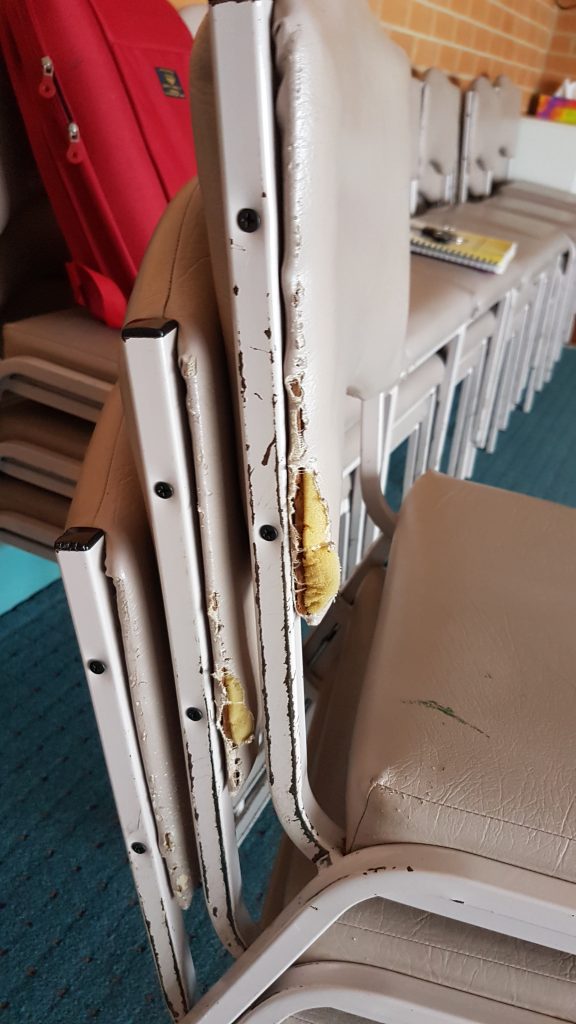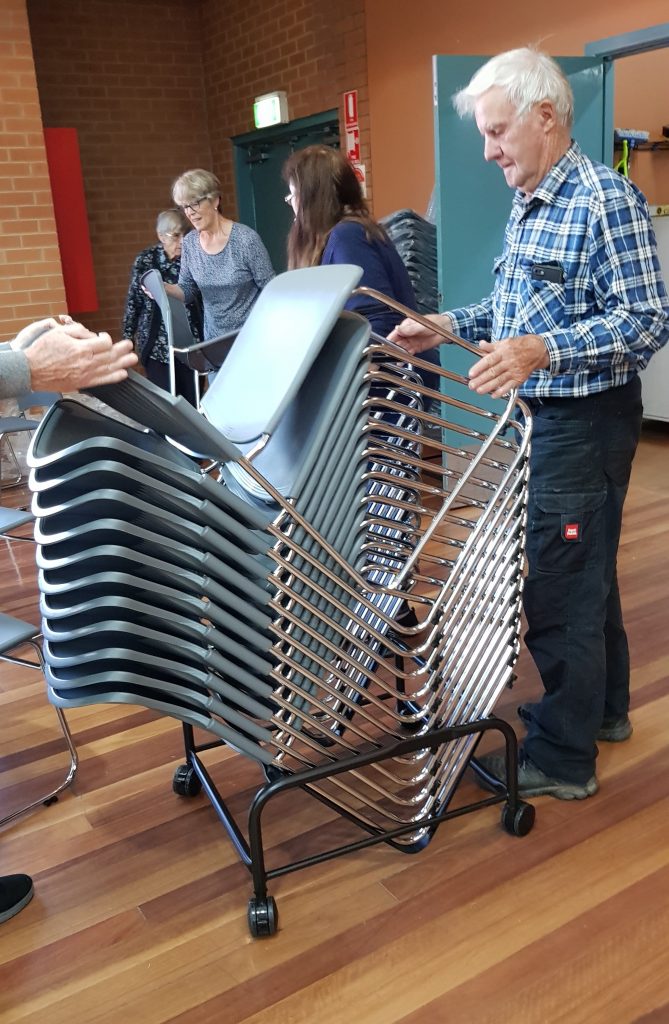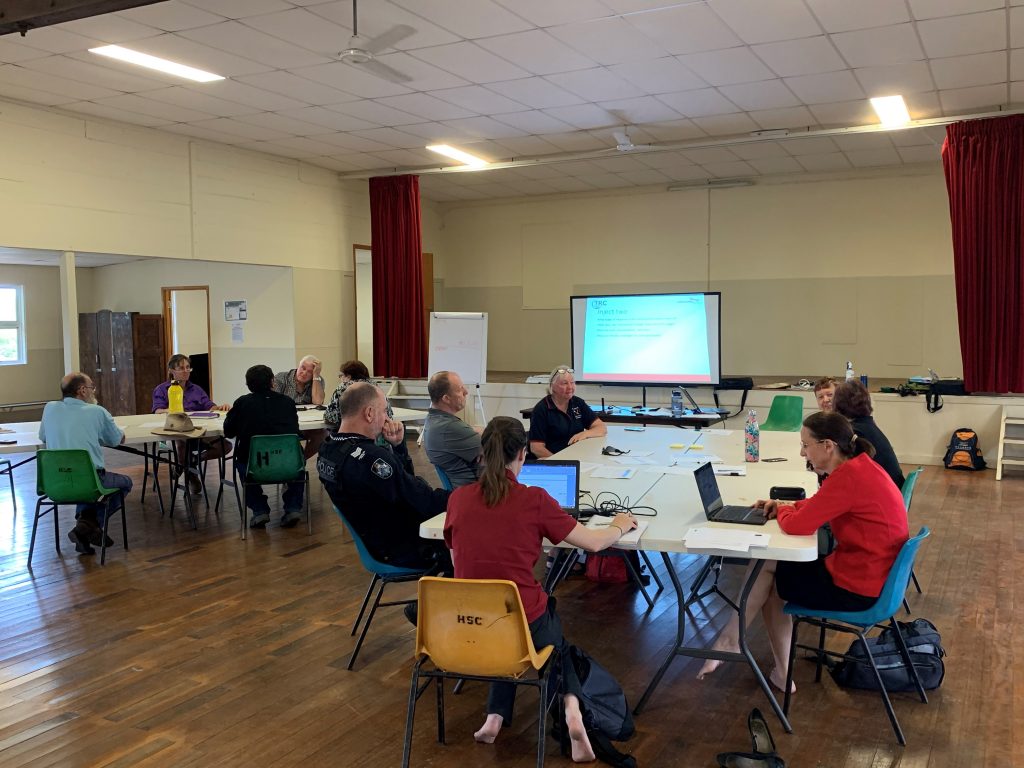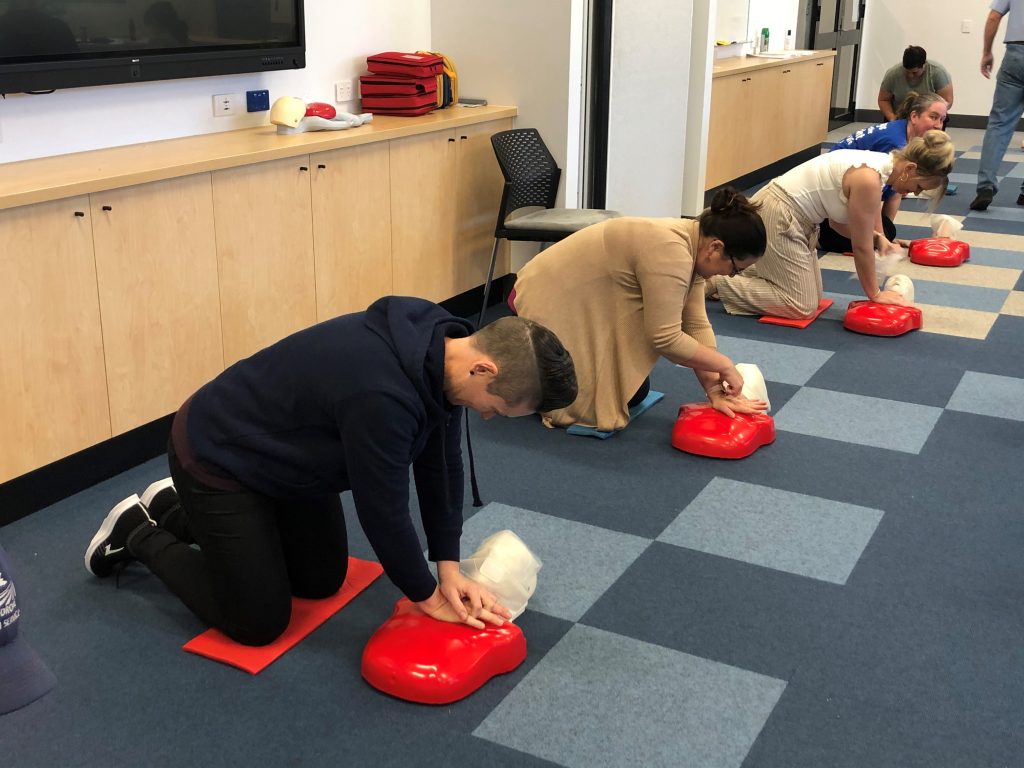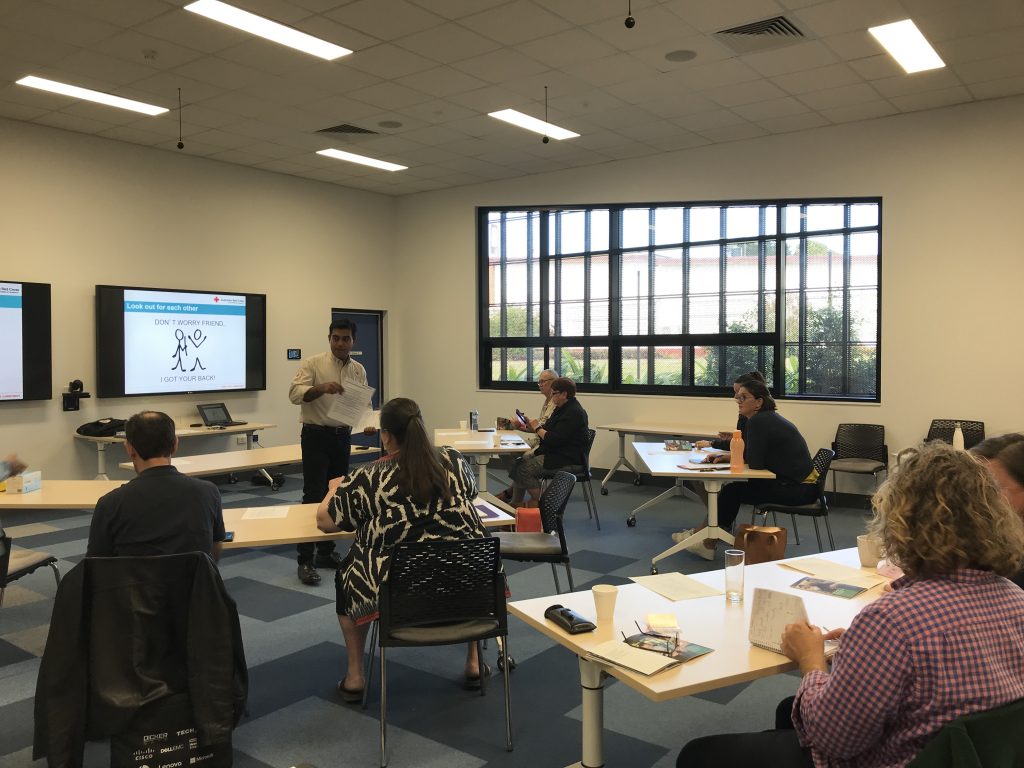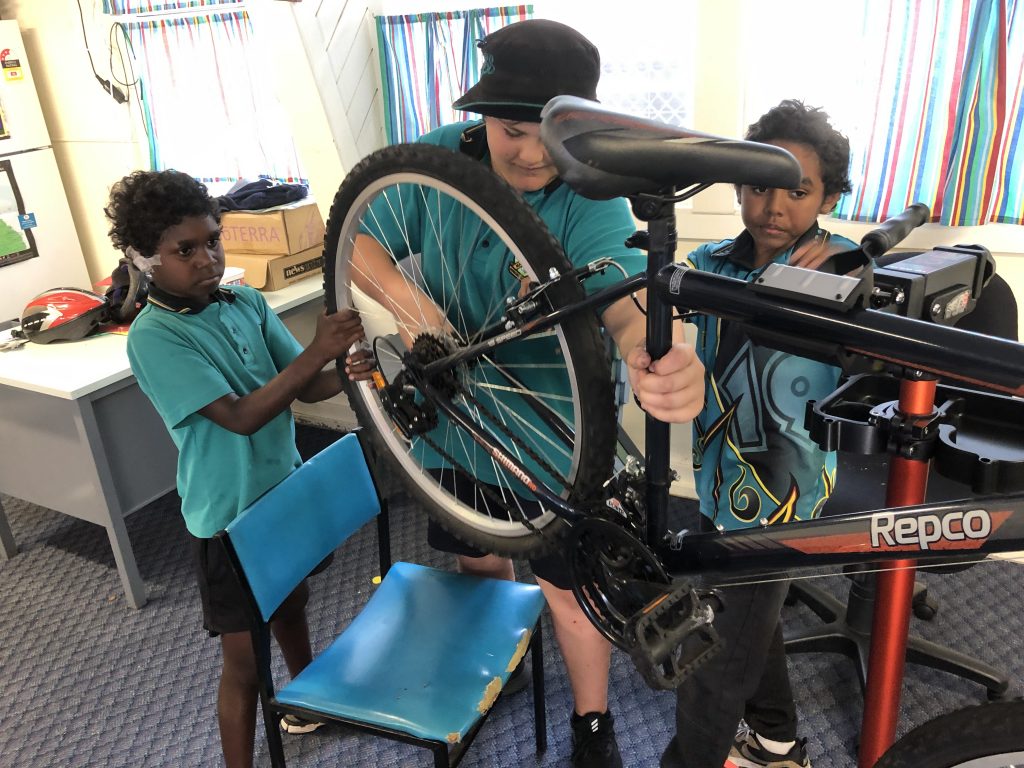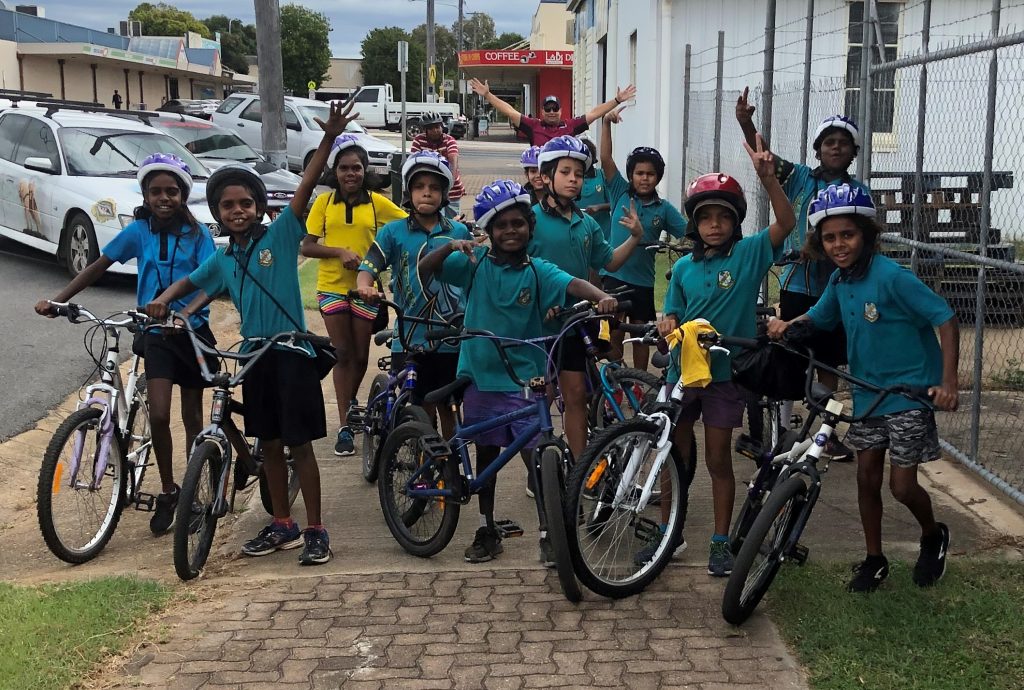Foundation for Rural & Regional Renewal (FRRR)
The FRRR team recently received some lovely feedback from the Management Committee of The Lakes Entrance Mechanics Community Hall. In 2021, they applied for a Strengthening Rural Communities grant to make upgrades to the community hall. Here’s what they had to say…
The Lakes Entrance Mechanics Hall Management Committee is delighted to announce that the new chairs, purchased with the support of a grant from the Foundation for Rural & Regional Renewal (FRRR), have arrived and are ready to use.
The Lakes Entrance Mechanics Institute Hall is the hub of community events. Ceremonies, celebrations, meetings, community clubs, federal and state elections, breakfasts, parties, dances, concerts and bingo all take place within its four walls.
Our old chairs were dilapidated, heavy, hard to stack, hard to move, and took up half of our storage space. Committee spokesperson Pennie Anderson is delighted. “I love these chairs’, she said.
“They are lightweight, ergonomic and stack easily on specially designed trolleys, so a whole stack of 20 can be moved by an average sized person. They take up half the space of the old ones in the storeroom”.
Purchased locally from Workplace Systems in Bairnsdale, the chairs have been met with approval from the regular hall users. Below are some of the comments from community members:
“They are awesome– very easy to move and set up for our productions” – Di Dixon, President, Lakes Entrance Amateur Dramatic Society
“We found the handling of the chairs a much easier exercise all round. Also, when chairs were moved around during the meeting there was not the annoying scraping noise on the floor” – Stan Barker, President, Lakes Entrance Garden Club
“They look very smart and are much quieter on the floor” – Bingo, Lions Club
There are many elderly residents living there in aged care in the Southern Highlands in New South Wales who have limited financial support. In fact, the community-owned Harbison Memorial Retirement Village – which provides up to 50% of their residential places to residents who can’t afford to pay for their care and accommodation – receives no government funding for wellbeing, or capacity building programs.
In 2021, Harbison initiated the Grand Friends Pilot Program, an inter-generational community initiative connecting elderly residents with Kinder to Year 2 students, their families and the wider community. Partway through, the program was suspended due to COVID and a lack of funding. But the Southern Highlands Community Foundation – an organisation fostering local philanthropy to support community needs and initiatives – auspiced a grant application on behalf of Harbison, and received $20,000 through FRRR’s In a Good Place (IAGP) program to complete their pilot.
Through the generous support of CCI Giving, this IAGP grant helped restart Harbison’s pilot program, which concluded in December 2021 following a short suspension. And with benefits for both aged care residents and children alike, the program has now begun to roll out to other local schools.
The weekly program involves Kinder, Year 1 and Year 2 classes hosting their Grand Friends, with everyone participating in structured activities, conversation and a shared morning tea. In between visits, the children write letters, make cards, rock friends and complete activities to prepare for the next Grand Friends visit – Grand Friends become part of the day-to-day discussions and activities in the classroom. Residents reported reduced loneliness and incidences of depression, improved memory, mood, confidence and mobility, and an increased sense of meaning and purpose in their life.. The program also saw evidence that participating children develop empathy, social confidence and language skills.
Harbison resident, Harold Griffin, believes it is a gift to be able to visit his junior class each week.
“I get a thrill out of attending the school visit. The energy and excitement the kids have, created by our group attending their school, is wonderful,“ Harold said.
Since 2006, the Tablelands community in Far North Queensland has experienced three cyclones, floods in 2015, bushfires in 2018 and higher than average monsoonal rains – and the impacts of climate change will likely increase the frequency, duration and severity of these weather patterns and natural disasters over time. With such a small population, this community must be largely self-reliant when it comes to initial disaster responses. So, they need to ensure they are ready when the next disaster strikes.
Thanks to the support of a private donor, the Tablelands Regional Council was awarded a $25,000 grant through FRRR’s Strengthening Rural Communities (SRC) program to run a series of free workshops across the shire. Presented in partnership with Queensland Fire and Emergency Services, these programs were designed to better prepare residents before and during disasters and build resilience for the recovery process.
Seven different workshops were delivered, including First Aid training, Psychological First Aid training, Leadership in Disasters Workshops, Exercise Ready2Respond and Queensland Disaster Management Arrangements (QDMA) training. The workshops aimed to support inclusive and resilient communities, build community capacity and cultivate integrated health and wellbeing. They also helped prepare the community for the impacts of climate change, including more intense weather events in future years.
The funding made it possible for 270 people across the region to participate in the training. In particular, the realistic, scenario-based Community Disaster Team exercise helped the community prepare for the upcoming disaster season. The workshops provided valuable ideas to help families, homes and businesses recover from adversity and many community members provided positive feedback.
Officer in Charge of the Atherton Queensland Ambulance Service, Terry Cumming, felt the training had not only better informed the Atherton community but also alleviated the pressures on Emergency Services during a disaster.
“The effort of getting our community involved in training, and capacity building can only strengthen community resilience and help all emergency services in times of need.”
A rural NSW grantseeker is proving that philanthropic investment in people and skills can produce a huge return on investment – bringing in more than $2.4million in grants for his community.
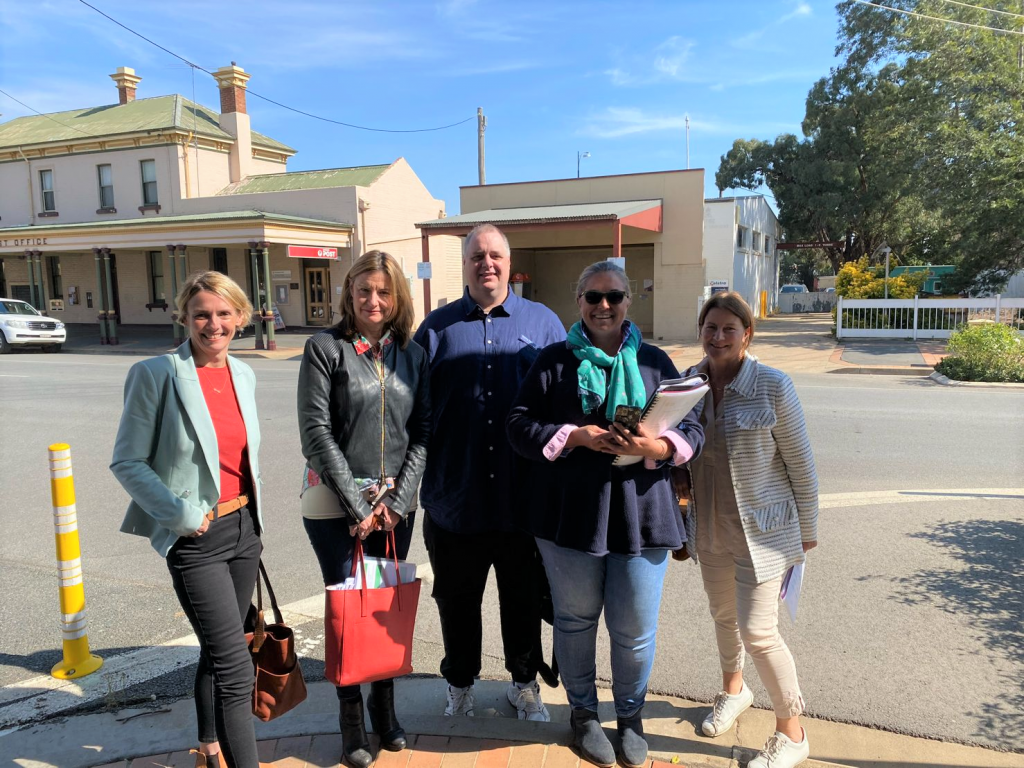
While many Government and philanthropic funders won’t give grants for funding people or capacity building, Junee Business and Trades Community Liaison Officer Nicholas Pyers is showing such investments can pay large dividends.
Nicholas’s role has been funded since 2019 by The Foundation for Rural & Regional Renewal (FRRR)’s Investing in Rural Community Futures program. He has been successful in helping win and advise on grants totalling $2,483,226 – and is awaiting news on a further $1million of grants that are in progress for Junee, which is located 440km south-west of Sydney in the Riverina region.
FRRR CEO Natalie Egleton said that since late 2018, regional NSW communities have faced a series of unrelenting disruptions, with drought, bushfire, flood and the COVID-19 pandemic continuing into 2022.
“The impact on these NFP organisations has been significant. It has taken its toll on the people that lead and run these organisations and has increased their load and affected their wellbeing. The sector has been dealing with extreme fatigue, burnout, limited fundraising options, access to volunteers, disconnection and, in some instances wholesale organisational change.
“The funding of Nicholas and the grant support role is a great example of how investing in local jobs and paying someone who has skills can result in high-yielding results and impact for organisations and communities,” she said. “This gives weight to our practise of employing local people and leveraging their position to help build the capacity of the entire town or community,” Ms Egleton said.
The impressive tally has been reached by a combination of activities. The grants have been won either by Nicholas directly developing a project concept and budget, then writing and submitting the grant application, or him reviewing other grant applications that have been submitted, as well as him identifying grant opportunities for other groups so they are able to apply. Nicholas also provides support to individuals in organisations, building their capacity and knowledge of grant writing, which allows them to prepare and submit grants, and secure funding for their own organisations.
FRRR’s Investing in Rural Community Futures (IRCF) model was developed in partnership with Vincent Fairfax Family Foundation (VFFF) and aims to strengthen local not-for-profit (NFP) organisations and, ultimately, enable them to thrive. It is a grassroots approach designed to build and support the capacity of individual and collective NFPs, over a sustained period of time.
This program now operates in seven communities in NSW, delivering a blend of grants and capacity building activities supported by local facilitators. Junee, Leeton and the Nambucca Valley were the initial cohort of communities supported by the Vincent Fairfax Family Foundation. Supported by The Snow Foundation Nowra, Ulladulla & Batemans Bay started an IRCF program in 2020 and further investment by Bendigo and Adelaide Bank’s Community Enterprise Foundation saw Bay & Basin communities join in 2021.
Successful grants for the Junee community range from upgrades to sporting facilities and meeting rooms through to projects supporting the likes of a museum.
Nine projects funded across NSW, QLD and WA
While drought is out of the media spotlight, for many communities it is still a very real and significant issue. FRRR’s Tackling Tough Times Together (TTTT) program has just awarded $86,083 to nine community initiatives in remote, rural and regional communities across Australia still dealing with the impacts of drought.
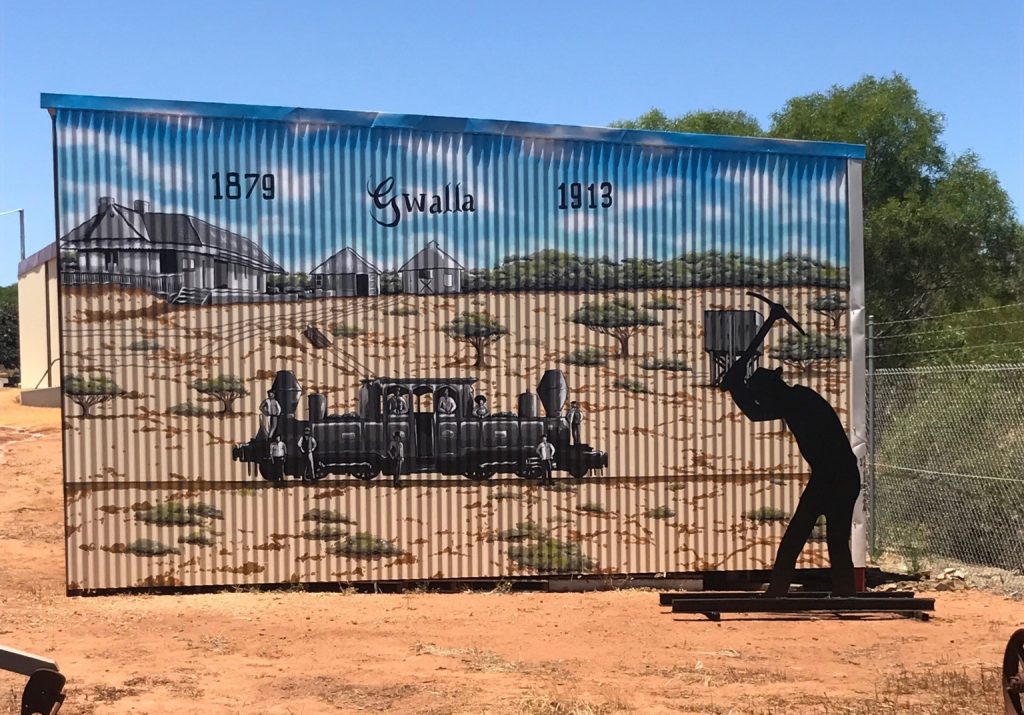
TTTT is a long-running, collaboratively-funded program that helps drought-affected communities to access the funding and resources they need to tackle the long-term impacts of drought. This round of grants will help fund a variety of projects run by local not-for-profit organisations and community groups, including a series of art workshops for both adults and children, a community event featuring Aboriginal artwork, the creation of murals and skills training to support community members experiencing loss and grief.
Nina O’Brien, FRRR’s Disaster Resilience and Recovery Lead, said that there are still many regions across Australia being impacted by drought.
“During this round of grants, the number of eligible LGAs dropped from 152 to 47. While we’re delighted to see such a significant drop in the number of communities being impacted by drought, it’s crucial that we continue to provide support. A lot of places, like remote SA, are still tackling extreme periods of dryness while others are very much still in drought recovery mode. Not to mention the fact that communities are dealing with a variety of other factors as they continue to stand strong and keep their community connected and supported.
“In this round of applications, we saw a lot of projects that are aiming to improve volunteer capacity and build a sense of social connectedness. If the last two years have taught us anything, it’s that our remote, rural and regional communities need volunteers and a strong sense of community in order to thrive.
“When we carried out our Heartbeat of Rural Australia survey last year, the results showed that the effects of drought, as well as the cumulative effects of multiple other disasters, have left volunteers feeling extremely fatigued, and those living in rural communities feeling isolated. That’s why we’re so pleased to be able to fund these kinds of grassroots initiatives at a time when they’re truly needed,” Ms O’Brien said.
Among the other projects funded this round were:
- Red Ridge Ltd – Longreach, QLD – Outback Fashion Festival – Canvas to Catwalk – Provide opportunities for Aboriginal artists from seven outback Queensland communities to participate in fashion print design workshops which culminate in a catwalk runway community event. $10,000
- Rattler Railway Company Ltd – Gympie, QLD – Fatigue Management Accommodation- Build the capacity, capability, and sustainability of Rattler Railway Company Ltd through infrastructure restoration and renovation to support volunteers. $10,000
- For a Better Chapman Valley (FABCV) Incorporated – Chapman Valley & Nabawa, WA – Winter Art Series in Chapman Valley – Facilitate social connection and enhance opportunities for the Chapman Valley community to participate in creative activities through the delivery of art workshops. $7,900
The full list of grant recipients and their projects is listed on the FRRR website.
The TTTT program supports drought-affected regions of Australia by giving community groups and local not-for-profit organisations access to the resources they need to respond to, and recover from, long-term rainfall deficiencies. This program has granted over $18 million to initiatives that are helping communities to tackle the tough times that come with drought.
Funding for this program is generously contributed by the Tim Fairfax Family Foundation, Pratt Foundation, Stockland CARE Foundation, Paul Ramsay Foundation, The Snow Foundation, Henroth Group and private donors from across the nation. To join these donors, and support grants like this through FRRR, you can make a tax-deductible donation at frrr.org.au/giving/.
The full list of grant recipients and their projects are below.
| Organisation | Project | Location | Grant | |||
|---|---|---|---|---|---|---|
| NEW SOUTH WALES | ||||||
| Moama and District Pre-School Centre Inc | Moama & District Preschool Brings Sober in the Country to Moama Improve the community’s social and emotional health and encourage local involvement by hosting a community dinner and guest speaker on drinking culture and supporting healthy choices. | Moama | $9,150 | |||
| QUEENSLAND | ||||||
| Congregation of Central Western Qld UCA | Edgely Hall Improvements Improve volunteer vitality and support social connection by installing air-conditioning in the multi-purpose room of the Longreach Uniting Church. | Longreach | $10,000 | |||
| Red Ridge (Interior Queensland) Limited | Outback Fashion Festival - Canvas to Catwalk Provide opportunities for Aboriginal artists from seven outback Queensland communities to participate in fashion print design workshops which culminate in a catwalk runway community event. | Longreach | $10,000 | |||
| Rattler Railway Company Ltd | Fatigue Management Accommodation Build the capacity, capability, and sustainability of Rattler Railway Company Ltd through infrastructure restoration and renovation to support volunteers. | Gympie | $10,000 | |||
| Kumbia & District Memorial School of Arts Inc | Kumbia & District School Memorial of Arts Inc Hall Improvements Boost and strengthen the local economy and reduce social isolation with town beautification in Kumbia through mural art. | Kumbia | $10,000 | |||
| Connecting Communities Australia Ltd | Let the Show Go On Improve volunteer vitality and support strong social connection by providing a team of volunteers to assist the Longreach Show Committee prepare and coordinate the Longreach Annual Show. | Longreach | $9,933 | |||
| WESTERN AUSTRALIA | ||||||
| The Isolated Childrens' Parents Association of (WA) Inc | 2022 ICPA Federal Conference Build communities’ resilience to continue to face the many ongoing issues and uncertainties that are inherent for families living in rural and remote Australia by hosting a conference where participants connect and learn from one another. | Various | $10,000 | |||
| Busselton Hospice Care Incorporated | Increasing the Capability to Support Grief and Bereavement in our Compassionate Community Empower a community group by providing skills training and capacity building to further support community members experiencing loss and grief. | Busselton | $9,100 | |||
| For a Better Chapman Valley (FABCV) Incorporated | Winter Art Series in Chapman Valley Facilitate social connection and enhance opportunities for the Chapman Valley community to participate in creative activities through the delivery of art workshops. | Nabawa | $7,900 | |||
Two free capacity building workshops for people volunteering or working in Bega Valley’s not-for-profit and community sector are now available, thanks to FRRR’s Investing in Not-for-Profit Capacity in Regional NSW program.
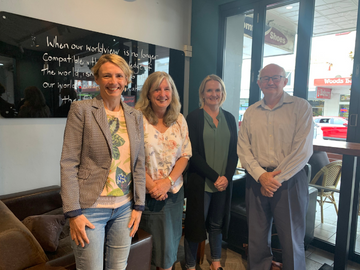
The Program, a partnership between the Foundation for Rural & Regional Renewal (FRRR) and the Paul Ramsay Foundation, aims to support the resourcing and capacity of grassroot not-for-profits, helping them to respond and thrive in the face of current challenges. It offers a program of activities including local workshops, skill development and networking to help create local solutions to local issues. Grants were also awarded through the program in 2021.
FRRR’s Philanthropic Services Manager, Jo Kemp, said the workshops aim to add value beyond grants awarded last year.
“Over the last nine months, we have been talking with and listening to the Bega Valley community. These workshops will explore the themes of growing a flourishing volunteer community and will also help local organisations to develop strategies for responding to community needs across Bega Valley. The sessions have been designed around the suggestions that have been raised during our conversations with community members and have been received with enthusiasm by local leaders.
“During a workshop held last year we were excited to hear about the interest among local groups to find ways to collaborate and develop a shared vision to best respond to community priorities across the Valley. We hope that these workshops will help to build on those ideas,” said Ms Kemp.
| Topic: Engaging and Sustaining Volunteers Date: Tuesday 17 May 2022 Time: 9.30am – 1.00pm Venue: Gulaga Room, Bega Valley Commemorative Civic Centre REGISTER: https://bit.ly/volunteer_bega | Topic: Collaboration & Strategy Development Date: Wednesday 25 May 2022 Time: 9.30am – 4.00pm Venue: Biamanga Room, Bega Valley Commemorative Civic Centre REGISTER: https://bit.ly/collaboration_bega |
The sessions are free and numbers are limited.
In 2021 the Bega Valley Shire Business Forum received a $60,000 grant to strengthen the resourcing of the seven members Chambers of Commerce in the Bega Valley. Nigel Ayling, President Merimbula Chamber of Commerce, said that the funds made a huge difference.
“The funds received from FRRR for a Coordinator and Grant Writer have been invaluable in supporting our Chambers and sourcing extra funds. The workshop exploring strategies for volunteer engagement will definitely be of interest to our members and I look forward to attending. We really appreciate the support from FRRR and look forward to working with them again in the future,” he said.
Investing in Not-for-Profit Capacity in Regional NSW is an 18 month place-based program running in three bushfire affected communities, being Bega, Taree and Wingham, and Glen Innes. For more information visit https://frrr.org.au/investing-in-not-for-profit-capacity-nsw/.
For queries about the workshops, email info@frrr.org.au or call 1800 170 020.
In many rural communities, non-denominational school chaplains promote strong community connection, participation opportunities and engagement to reduce isolation and encourage better physical and mental health. While these positions are generally funded through local donations, in recent years there simply hasn’t been the money to fund them locally due to drought and, more recently, reduced tourism from COVID-19 restrictions.
Through FRRR’s Tackling Tough Times Together grant program, Scripture Union Queensland received $131,490 to support chaplaincy positions at Ravenswood State School, Charter Towers Central State School and Mareeba State School until June 2022. The grant was made possible through generous donations from the Sidney Myer Fund and the Tim Fairfax Family Foundation.
This funding ensures all programs and activities coordinated by the chaplains, including one-on-one pastoral care conversations and classroom support, are free for all children, young people, families and school staff. These activities help to reduce isolation and increase wellbeing and community participation in communities suffering from the long-term effects of drought.
Since funds were awarded in 2019, the schools have been able to implement change and growth within their chaplaincy programs. At Ravenswood State School, chaplain Anne – a much loved member of the community – was finally able to retire at 83 years old. Her position has been filled by a long term local Charters Towers resident, who works two days a week.
The chaplain at Charter Towers has been able to increase her support to two days a week and is seeing a positive response to the ‘Girls with a Purpose Resilience’ program. Twelve students completed the program in 2019 and there was general consensus among the participants that it was a special time engaging with facilitators and peers. After the COVID-19 school closure in 2020, all girls in grade 6 are now taking part in the program.
A particular highlight for the Mareeba State School has been the implementation of the Bike-Bus program to encourage regular physical activity and increase school attendance and social and community engagement. Since being established in mid-2019, the program has engaged 30 students, as well as parents, grandparents, siblings, teachers and police. It also led to the creation of the Bike Repair Club – an alternative for those who enjoy hands on learning, with all students becoming much more engaged in their education.
The principal of the Mareeba State School, Mandy Whybird, noted the program’s positive impact.
“Our school chaplain provides an invaluable source of support for the students at Mareeba State School. Aside from running friendship groups, supporting children in classes and running lunchtime activities for children who may find the playground challenging, our chaplain also assists in providing breakfasts for children in need and working with children who may have experienced loss or trauma.
“The chaplain also assists to support staff well-being. When our school was shaken by the loss of a teacher last year, our Chaplain was integral to the recovery process for staff,” Ms Whybird said.
Thirty-four local groups and not-for-profits that delivered food and care hampers to regional communities during the height of the 2021 COVID-19 restrictions will share in $300,000 from the NSW Government’s COVID Regional Community Support (CRCS) program.
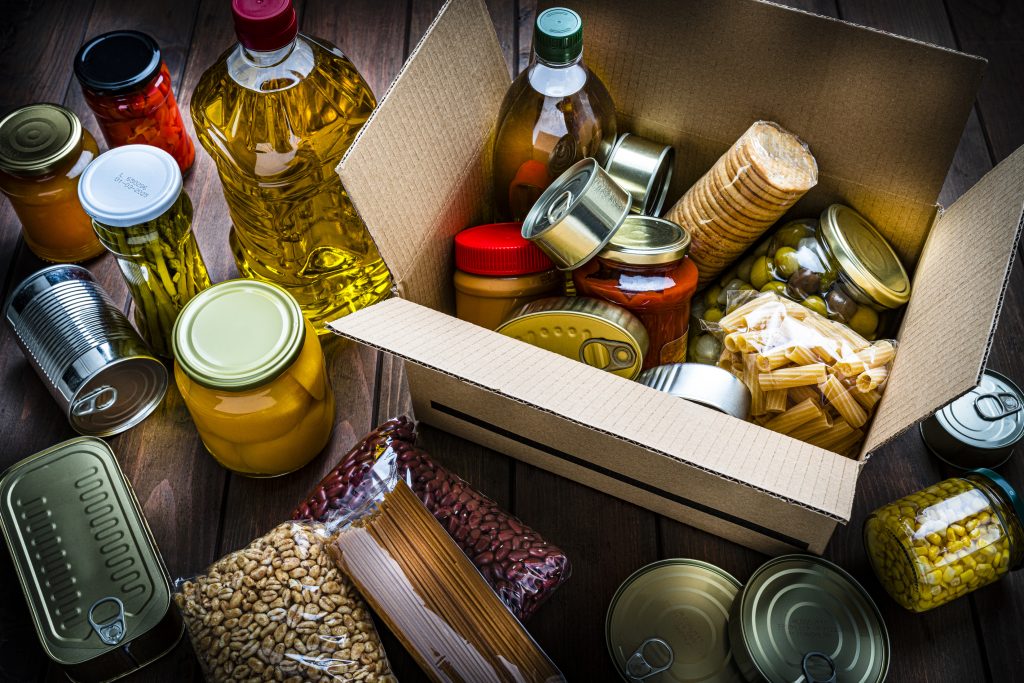
Minister for Emergency Services and Resilience and Minister for Flood Recovery Steph Cooke said more than 72,000 hampers were delivered to residents in regional and rural parts of NSW, including Ballina, Tweed Heads, Leeton and Albury.
“These groups and organisations dropped everything and dipped into their own funds to support isolated residents during last year’s COVID-19 restrictions by partnering with Resilience NSW to prepare and deliver food, essential items and relief packs to those in need,” Ms Cooke said.
“The $300,000 will cover expenses like fuel, couriers, and logistics costs, helping these groups and organisations to continue their wonderful work into the future, including at the Ballina Hot Meal Centre which is using its $5,024 grant to purchase new freezers.”
Each grant being provided through the CRCS program ranges from $1,000 to $30,000 and is administered by the Foundation for Rural & Regional Renewal.
Foundation for Rural & Regional Renewal CEO Natalie Egleton said the funding recognises the critical role that local community groups played during the pandemic.
“We’re delighted that 23 per cent of applications are from Indigenous community groups, all of which played such a vital role in ensuring that their community members were cared for, and we are pleased to be able to support them with this funding,” Ms Egleton said.
Applications are currently being accepted for grants of up to $50,000 for capacity building initiatives, such as attracting and retaining volunteers and staff, enhancing governance skills, building digital capacity and creating partnerships that foster stronger, more resilient communities.
See the full list of recipients below:
| Organisation | Locations | Grant |
|---|---|---|
| Agape Outreach Incorporated | Tweed Heads - Byron Bay | $1,681 |
| Albury Wodonga Regional Foodshare | Albury | $13,500 |
| Allambi Care Limited | Lake Maquarie - Warners Bay - Central Coast - Cessnock - Newcastle | $7,000 |
| Armidale / Uralla Meals On Wheels Incorporated | Armidale | $3,183 |
| Ballina Hot Meal Centre Incorporated | Ballina | $5,024 |
| Belong Blue Mountains Incorporated | Blue Mountains | $1,000 |
| Camden Haven Community at 3 | Lakewood | $1,125 |
| CatholicCare Social Services Hunter-Manning | Newcastle - Tareer - Forster - Maitland | $1,977 |
| Christian Outreach Centre | Kempsey - South West Rocks - Macksville - Nambucca Heads | $1,350 |
| Community Resources Limited | Wollongong | $3,540 |
| Coonamble Neighbourhood Centre | Coomamble - Gulargambone - Quambone | $10,810 |
| Food For Life Community Care Incorporated | Shoalhaven - Primbee - Wollongong - Kiama | $13,500 |
| Galambila Aboriginal Corporation | Nambucca Heads - Coffs Harbour - Woolgoolga - Bowraville | $30,000 |
| Gloucester Worimi First Peoples Aboriginal Corporation | Gloucester | $1,000 |
| Gunnedah Meals on Wheels Association | Gunnedah | $5,514 |
| Indigenous Futures Foundation Limited | Tweed Heads South - Lismore - Ballina - Grafton | $30,000 |
| Ivanhoe Central School | Ivanhoe - Balranald - Carrathool | $6,100 |
| Katungul Aboriginal Corporation Regional Health And Community Services | Batemans Bay - Narooma - Bega - Catalina - Dalmeny | $30,000 |
| Kempsey Neighbourhood Centre Inc | Kempsey | $4,500 |
| Leeton Community Care Development Incorporated | Leeton | $13,500 |
| Lions Club Of Raymond Terrace Incorporated | Raymond Terrace | $1,420 |
| Livefree Project Incorporated | Newcastle | $13,500 |
| Miyay Birray Youth Service Incorporated | Moree - Mungindi - Garah - Boomi | $18,345 |
| Moree Sports Health Arts And Education Academy Aboriginal Corporation | Moree | $5,723 |
| Orana Support Service Incorporated | Dubbo - Wellington - Narromine | $21,000 |
| Oxley Community Transport Service Incorporated | West Tamworth | $4,500 |
| Queer Family Incorporated | Mullumbimby - Byron Bay - Lismore - Kyogle | $2,250 |
| Salt Care | Ulladulla - Bomaderry - Nowra - Kangaroo Valley - Jervis Bay | $20,460 |
| Sapphire Community Projects Incorporated | Bega - Tura Beach - Bermagui - Candelo - Quaama | $4,703 |
| Seventh-Day Adventist Church - South New South Wales Conference | Bathurst - Blayney - Mandurama - Cowra | $5,600 |
| The Heartland Foundation Limited | Port Macquarie | $5,000 |
| The Mend AND Make Do Crew Incorporated | South Grafton | $6,750 |
| Uralla Neighbourhood Day Care Centre 1 | Walcha | $4,860 |
| Weilwan Local Aboriginal Land Council | Gulargambone | $1,585 |
During recent community planning led by Murrindindi Shire in the Yea region of Victoria, which is located around 100km from Melbourne, the need to increase awareness of local history and culture was highlighted. To address this need, a working group, named Honour the Taungurung Community Project Group, was formed.
The group, which are part of the Yea Community Service Group, set out to address a lack of local information and visual acknowledgement of the past and present Taungurung people. The group decided that the creation of a meaningful Taungarung designed art installation was the perfect way to begin telling the true history of their shire.
Yea Community Service Group successfully applied for a grant of $28,734 from the Victorian Bushfire Appeal Fund. The grant funded the artwork, engineers’ drawings, Council permits and the installation, as well as a welcome ceremony, research and project administration.
Now, with the project complete, the significant and celebratory artwork is located in the main street of Yea and acts not only as a centrepiece for the town but also as a meeting place and a celebration of local history.
Once the art installation was completed, an unveiling and welcoming ceremony was held and attended by many town members. As a result of this project, the town now has a meaningful site where Indigenous days of recognition can be celebrated, as well as an enduring landmark in honour of the Taungurung people. Community connectedness, sense of place and community identity have all been strengthened in the months following the installation.
$200,000 available to fund community-led mental health projects
Remote, rural and regional communities across Australia can apply now for grants through FRRR’s In a Good Place (IAGP) program to support community-driven activities focused on mental health and wellbeing. Offered in partnership with CCI Giving, there is $200,000 available through grants of up to $20,000 for projects that support vulnerable community members at risk of, or experiencing, mental health issues.
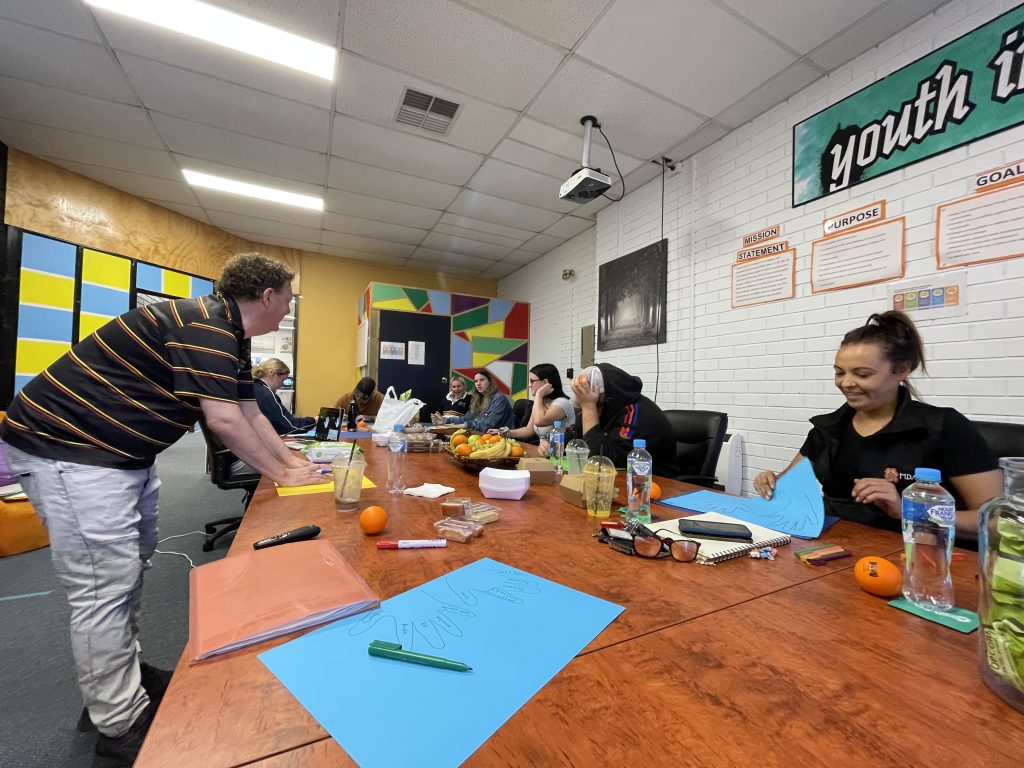
The program supports a range of approaches that are preventative or responsive in nature, and clearly and directly focus on strengthening mental health and wellbeing. These include initiatives that increase social participation and connections with the community, and reduce stigma surrounding mental health by encouraging open discussion and supporting self-help-seeking.
Jeremy Yipp, CCI Chief Risk Officer and Chair of CCI Giving, said that greater access to mental health services and support is vital to those living in rural communities, particularly following times of crisis.
“Rural and remote communities continue to be affected by events such as fires and flooding, and in recent years the pandemic. It’s more important than ever to encourage people to stay connected and seek support, especially for those living in places with limited access to mental health services.
“Our partnership with FRRR helps CCI Giving reach remote, rural and regional communities, to build and nurture social connections and community participation, and provide access to mental health training and education,” said Mr Yipp.
Jill Karena, FRRR’s People Programs Portfolio Lead, said that the events of the past few years have highlighted the need for rural Australia to have equitable access to mental health services and support.
“The impact of the pandemic, and the subsequent isolation, is still being felt and understood. But clearly, access to mental health tools, services and support that are driven by community need, are critical to improving and strengthening the mental health of remote, rural and regional Australians, particularly younger members of the community.
“As an example, through the IAGP program, the Youth Affairs Council Victoria (YACVic) in Swan Hill received funding of $13,480 to deliver a culturally specific Mental Health First Aid (MHFA) training program and establish a local support network – Deadly Yarning & Learning, targeting Aboriginal and Torres Strait Islander young people.
“Although initially intended to be delivered face-to-face, the COVID pandemic and lockdowns caused serious disruptions to the project. Instead, most training took place online. Aboriginal and Torres Strait Islander young people gained vital skills in MHFA, connected with each other, relevant workers and service providers, and increased their confidence and leadership skills while helping to shape local, culturally safe responses to mental health.
“Our partnership with CCI Giving means we can support these kinds of community-led approaches to mental health services that respond to community need and are accessible for people in rural areas who may otherwise have difficulty accessing services,” Ms Karena said.
Applications open on 20 April 2022. As in previous years, FRRR expects this will be a highly competitive program and so there is a two-stage application process. A brief Expression of Interest must be submitted no later than 5pm AEST, Wednesday 25 May 2022. The Expression of Interest form and more information is available on FRRR’s website – https://frrr.org.au/funding/place/in-a-good-place/. Applicants can also call 1800 170 020.
The IAGP program is the centrepiece of a partnership between FRRR and CCI Giving which has just been extended for a further five years, to run until 2027. Since the partnership began in 2018, IAGP has awarded $800,000 in grants to 53 community-led initiatives that promote good mental health and wellbeing in remote, rural and regional communities.

